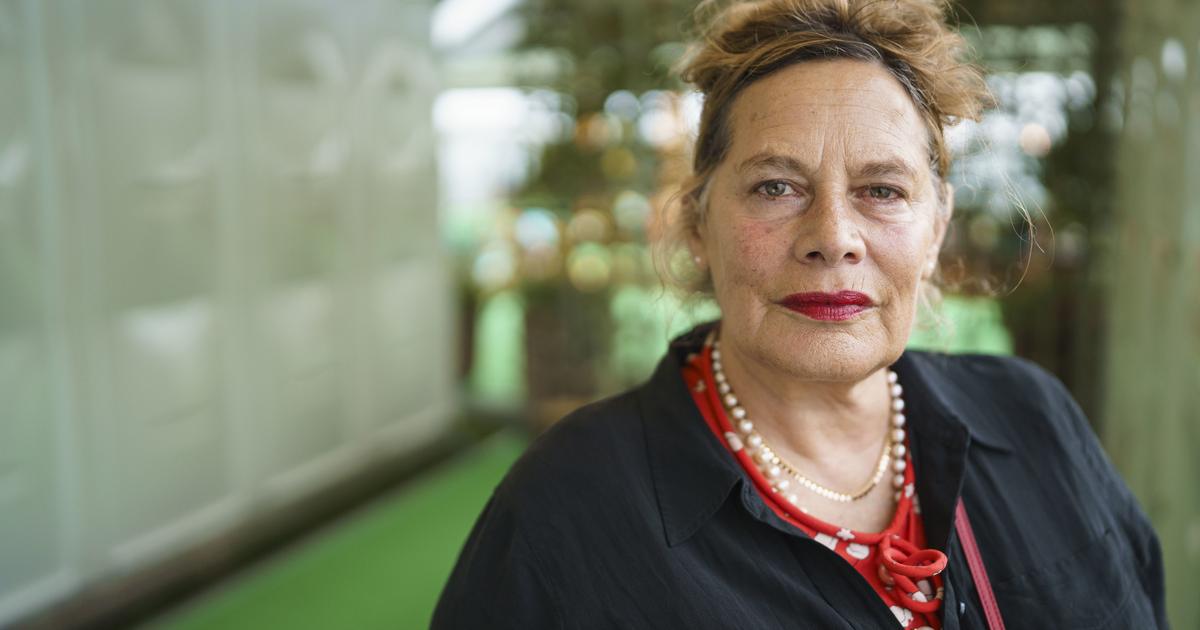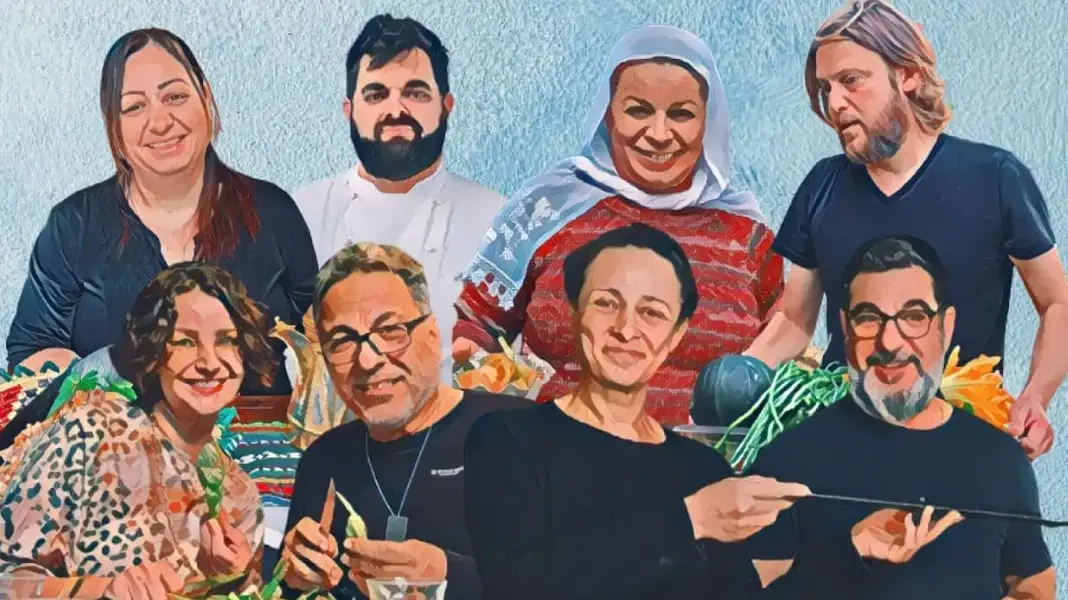We meet her one afternoon in May, in a hotel in Saint-Germain-des-Prés, in the late afternoon. Deborah Levy's day, which she tells us in detail, is already full. In Paris, where she has a studio, she spent her morning writing, then prepared lunch while listening to the radio, just to learn a few words of French: "Sometimes I also sing your songs". She shared her meal with a screenwriter friend: together, they talked about life, cooking and swimming pools, and this annoying tendency to forget these adapters for electrical outlets when you go abroad. But also writing: "My friend asked me what to do when she could not advance a scenario. I told him it was all about concealment and revelation."
To discover
- Join La Fabrique Littéraire Madame Figaro, between writing workshops and exclusive meetings with prestigious writers
See alsoRegister for Madame Figaro's first literary workshop with Minh Tran Huy
Five minutes of conversation with Déborah Levy are a reflection of her work: an abundance where the intimate mingles with the universal, material questions with literary or existential questions. Novelist and playwright, the 63-year-old British author born in South Africa has recently found success with an autobiographical trilogy that she wrote almost "live", in touch with the present time: What I do not want to know, The Cost of Life, and State of play, published by Éditions du Sous-sol in 2020 and 2021. Deborah Levy addressed the pain of divorce after a long marriage, the financial worries experienced by most separated women, her relationships with her daughters, her work as a novelist. But also the simple joy of hurtling down the hills of London on an electric bike. Today, she publishes La Position de la cuiller (et autres bonheurs impertinent) (1), a collection of texts in which she pays tribute to the authors and artists who, from Lee Miller to Virginia Woolf, Colette, Simone de Beauvoir and JG Ballard, inspired the woman and writer she became. She also signs pages on seemingly trivial moments of her life. By reaching, always, heights of lucidity, fierce humor, and fantasy.
In video, "A la page" with Karine Tuil for "Kaddish pour un amour"
Writing rituals
Madame Figaro.- La Position de la cuilleris a collection of texts that will first be published in France. Do you have a special connection with our country?
Deborah Levy.- Yes. You can build yourself through literature from all over the world, and I grew up with yours. I grew up with Colette, I always wanted to have her childhood. I would have loved to be born in Burgundy, to have a braid up to my knees, to have my mother make me hot chocolate and then draw my attention to the cry of an owl, a flower or a spider. But I was raised in the suburbs of London: we had a small garden, a small apple tree, some daffodils. Nevertheless, in my mind, I thought that what I needed was the warmth of Burgundy. Already, I was building another life.
Were these texts written in the small cabin you rentat the bottom of a garden in London, and that you describe in The Cost of Living?
You know what? This house has been sold, I no longer have a cabin. I want another one, that's what I want most in the world right now.
So where do you write?
I write in my flat in London. I live with my daughter, who has just finished university. It's very noisy because his friends visit him and I really like to talk to them, to know what's going on in their lives, to find out what makes them happy or sad, to listen to gossip, to look at their clothes... So when necessary, I retire to a room in my apartment. Now I also rent a studio in Paris. If I have something very special to write, a specific idea to think about, friends to see... Or all at the same time, I come here. And I like to write early in the morning, around 7 a.m.
The position of the spoon (and other impertinent happiness), by Deborah Levy presses
Making a place for yourself
What binds together the female authors you write about in The Position of the Spoon?
These are women who all had to create a place that was not written for them in society. They had to build, write their lives. Virginia Woolf is an interesting example. She was a middle-class woman, who educated herself through the books in her father's library. His brothers were allowed to go to university in Cambridge. She was ashamed of not having been educated, and yet she became one of the greatest authors in the world. I often think of his novel, Mrs Dalloway. The story is set in 1923, the book was published in 1925. Virginia Woolf witnessed World War I and the Spanish flu pandemic. Important, historic moments. We ourselves have just gone through a pandemic, and no sooner does it seem to be fading away, than there is war in Ukraine. I suddenly understood why Virginia Woolf began her novel with Mrs. Dalloway buying flowers. It may seem frivolous, light; But it testifies very fairly to the way she led her life, through these great events. I also have a passion for Marguerite Duras, because in her books, she can do what she wants with time. In L'Amant, she evokes her face, when she is already old. And suddenly, she takes us back in time, on a ferry that crosses the Mekong. She taught me everything I know about the time, structure, and subjectivity of a story. All these women had to create a life for themselves. A life they would not have been given otherwise.
Marguerite Duras taught me everything I know about the time, structure and subjectivity of a narrative
Deborah Levy
All of them have also experienced a heartbreak, a wound that forced them to rebuild themselves, to create something else. Is this also your case?
Yes, but in a less extreme way: I experienced a separation after a long marriage. We had to live in separate houses, find another way of life. Many people share this experience. But you can also find pleasure: that of building a new life, a new family around your friends. The pleasure of cooking, cycling, watching your children grow up. Everyone thinks that love will last forever. And no matter how many books we read, we end up knowing that this will not be the case. You have to know how to mourn it, live with it. All of these topics are the ones I address in my book.
Do books help to live?
I would like to give you a clear answer, but I do not have one. Maybe it will come, in a few years. In my books, of which I am the main subject, I have created a narrator who speaks in the first person, who looks a lot like me but is not exactly me. What was important to me was to make a female voice heard that could be strong, powerful, but also fragile and solitary. Because that's who we all are: we don't have power all the time, but we don't have to keep collapsing, but neither do we. We can be all of these at once, and that's what I've tried to say through this narrator. You have to come back to me in three years, and ask me if it helped me. What I do know is that as women, we need to demonstrate loud and clear what we want in this world, the connections we want to make, and find pleasure in everyday life.
Strong, powerful, but also fragile and lonely, that's who we all are
Read alsoWith Listen to me until the end, Tess Gunty signs a great American novel
Shoes and lemons
There is a lot of funny and impertinence in your books. Is humor a muscle that you have to work all your life, at the risk of losing it?
I don't think so, otherwise you're more of a comedian. I believe that humour is part of the tragedy, and that it is part of a real deep thought. If you don't have humor, it means you don't think enough.
You also often write about objects: in The Position of the Spoon, you devote a chapter to Creepers, those shoes you wore when you were a teenager, to the lemons you like to put in your kitchen... Why are they so important?
Because they are part of our world. We invest a lot of feelings in objects. It starts in childhood, when we bring our toys to life. The same mechanism occurs with objects. Sometimes they are just aesthetically pleasing. I like to have something in my house that I like to look at. It can be small, very simple, as long as it flatters the eye. In objects, there are our emotions, our memories. Sometimes we just like their design. But writing is also design.
(1) La Position de la cuiller (et autres bonheurs impertinent), by Deborah Levy, 208 p., Éditions du Sous-sol.















